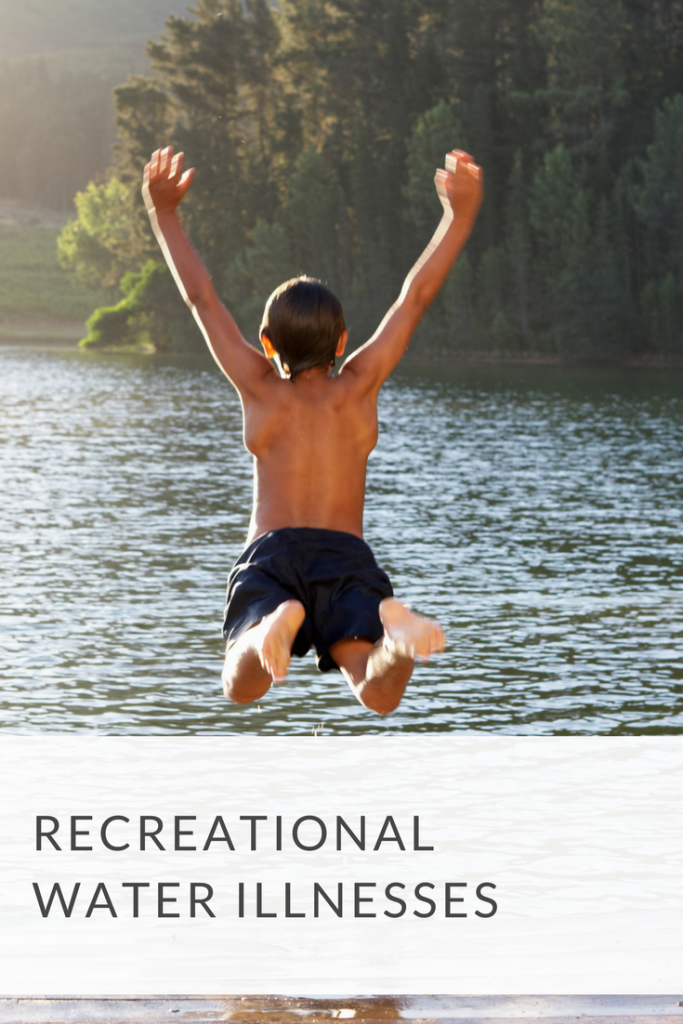Recreational Water Illnesses

Recreational Water Illnesses
Since the late 70’s, Recreational Water Illnesses (RWIs) have been increasingly important. As summer approaches so does a season full of water-related activities. It is important to be aware of the risk of RWIs and how to safely participate in water-related activities with your family.
Recreational Water Illnesses
RWIs can be a wide variety of infection types, including:
- Gastrointestinal
- Skin
- Ear
- Respiratory
- Eye
- Neurologic
- Wound
- The most commonly reported RWI is diarrhea.
Where are Recreational Water Illnesses Found?
RWIs are caused by germs that are spread by swallowing, having contact with or breathing in mists or aerosols from contaminated recreational water. This includes:
Hot tubs
Skin infections, like “hot tub rash,” are spread through hot tubs and spas. This is because the high temperatures make it hard to maintain the disinfectant levels needed to kill germs. That’s why it is important to check the disinfectant levels in hot tubs even more regularly than in swimming pools.
Swimming pools, water parks and water play areas
To ensure that most germs are killed, it is important to check chlorine or other disinfectant levels and pH regularly as part of good pool operation.
Fountains
Not all decorative (or even play) fountains are chlorinated or filtered. Therefore, when people (especially diaper-aged children) play in the water, they can contaminate the water with fecal matter. Swallowing the then contaminated water can cause diarrheal illness.
Lakes, ponds, rivers, streams and oceans
These natural bodies of water can be contaminated with germs from a variety of things including animal waste, water runoff, fecal incidents, sewage spills and germs rinsed off the bottoms of people swimming. It is very important that you do not swallow the water because natural recreational water is not disinfected.
Additionally, it is important to avoid swimming after rainfalls (due to water runoff) or in areas identified as unsafe by health departments.
Who is Most Likely to Get Ill from a Recreational Water Illness?
Children and pregnant women are among those who are most likely to contract an RWI. People with weakened immune systems, such as those living with AIDS, individuals who have received an organ transplant or those who are receiving certain types of chemotherapy) can suffer from a more severe illness if they contract an RWI. People with a weakened immune system should consult with their primary care provider before participating in any water-related activities.
Symptoms of a Recreational Water Illness
While the symptoms of RWIs can vary, the most common include diarrhea, vomiting, stomach cramps, loss of appetite, weight loss and fever. Other types of RWIs can have eye, skin, ear or respiratory symptoms.
Chlorine Kills Germs… But Not Always
Contrary to popular belief, chlorine does not kill all germs instantly! While Crypto (short for Cryptosporidium, the parasite that causes diarrheal disease) is tolerant to chlorine, most germs are not. So keeping chlorine at the recommended levels is essential to maintaining a healthy pool, and therefore, preventing RWIs.
The CDC recommends pH 7.2 – 7.8 and a free chlorine concentration of at least 1 ppm in pools/3 ppm in hot tubs and spas. Learn more about chlorine recommendations here.
So… why is pH important in relation to RWIs?
- As pH goes up, the ability of free chlorine to kill germs decreases, especially if the pH is >0.
- As pH goes down, the ability of free chlorine to kill germs increases, but the pool, hot tub or spa pipes are more likely to corrode, especially if the pH is < 7.0.
- Keeping the pH in the 7.2 – 7.8 range best balances killing germs to prevent RWIs, extends the lifespan of the pipes and keeps swimmers comfortable.
Steps for Healthy Swimming
While contracting an RWI is possible, it doesn’t have to stop your summer fun! It is very possible to participate in safe, water-related activities.
- Check the pool – well-maintained pools are less likely to spread germs. If you are in a public pool or water park, be sure to ask someone about the latest inspection results and pH levels.
- Stay clean when entering a body of water – keep any dirt, bodily fluids or fecal matter out of the water by showering before you enter. Additionally, if you are currently battling an illness, such as diarrhea, or have an open wound, you should avoid the water.
- Don’t swallow the water – swallowing any recreational water increases your chances of contracting an RWI.
My Child May Have an RWI
If your child is showing any symptoms of an RWI and has been near a recreational body of water recently, call Building Blocks Pediatrics at (660) 262-7415.

